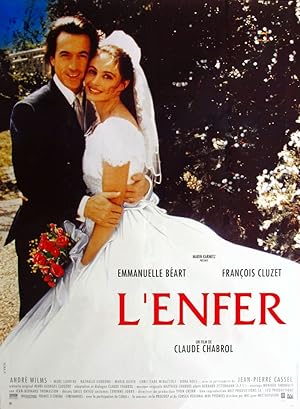After I watched Heaven, which was originally conceived as a trilogy and written by Krzysztof Kieślowski, but directed by Tom Tywker, I wanted to see the second and only other movie made in the trilogy, L’Enfer, which means Hell. So I looked up the title on Netflix and requested the DVD. After I got it and watched it, I realized that it could not possibly be the second movie because L’Enfer (1994) was made before Heaven. Well, it turns out that there are two movies named L’Enfer, and Emmanuelle Beart stars in both films, but the second in the trilogy was in theaters in 2005 and does not appear to be available in the US. Fortunately I did not regret choosing the wrong film, L’Enfer (1994)!
L’Enfer (1994) follows a man after he proposes to his wife and starts his business as a hotel owner on a lake in the French countryside. L’Enfer (1994) fast-forwards to a time when his business is prosperous, his wife is still beautiful and in love with him, and he is a father. His life is perfect, but he begins to see things that plague him with doubts over whether or not it is all façade or reality.
S
P
O
I
L
E
R
L’Enfer (1994) is really about how something that seems initially reasonable is actually a sign of delusion and a symptom of mental illness, delusional disorder if I may don my armchair psychologist hat. L’Enfer (1994) perfectly employs the film version of the unreliable narrator, the unreliable protagonist, by not tipping its hand until late in the film and juxtaposing scenes that could not possibly happen. Initially it may seem like a portrait of jealousy, but his earlier comments that neighboring businesses are trying to sabotage his business was a clue. Others mistake his belligerence as a negative personality trait and understandably avoid him, but L’Enfer suggests that the departure from his earlier self means that the opposite is needed: intervention and confrontation by a professional. The unreliable protagonist seeks control over others, including his guests, because he has none over himself.
L’Enfer (1994) is also a powerful depiction of how abuse escalates in a marriage. L’Enfer (1994) was the first time that I saw value in depicting events from the abuser’s point of view. L’Enfer (1994) never devolved into a Lifetime movie. Even though initially I had doubts whether or not his wife is cheating on him, by the end, that question is irrelevant. There is literally nothing that she can do to make him happy, and her early efforts to accommodate him are wasted efforts at soothing the voices in his head. It is one thing to say you will do anything for someone then actually do it.
Her transformation from a sexy, happy wife and hostess to a withdrawn, terrified hostage and victim is tragic and unquestionably not her fault. The final scenes where he imagines her on the phone conspiring against him when he knows that he has made this literally, physically impossible for her are gut wrenching and retroactively discredits his earlier perspective of her. L’Enfer (1994) is rough to watch, but essential because it shifts focus from the victim to the abuser, i.e. the person who is really at fault and makes the viewer question our assumptions about the sexy, French wife who has male friends. We are also condemned for initially relating to the husband.
After watching L’Enfer (1994), I was actually surprised that one notable reviewer thought the opposite after considering and rejecting the idea that she is a captive, but somewhat complicit in his madness by not doing more to erase his suspicions. This reviewer is more knowledgeable than I am about the director of L’Enfer (1994), Claude Chabrol, but I am going to say that while better than me, may just be wrong this time. He is really stuck on her looks, and she does bust out of her outfits, which I thought was great for someone running a hotel, raising a kid, having friends and throwing love and desire at her husband. He also questions why she doesn’t leave earlier.
If L’Enfer (1994) really is from the husband’s point of view, and not objective reality, maybe she is not the sexpot that he imagines her to be, but if she is, to view that as a negative and not a benefit is madness. I also think that the question regarding why abuse victims do not leave earlier is a fascinating one, but failure to leave should not be equated with a type of consent. It is denial. She just thinks her husband is stressed out, not literally losing his mind, and by the time she realizes the truth, she leaves when she can, and it still does not work. L’Enfer (1994) was made at a time when we knew less about domestic violence than we do now, and even with the knowledge that abuse can lead to death, people still die even if they do leave. So the reviewer can be forgiven for not knowing better then, but I think L’Enfer (1994) was ahead of its time for dismissing the idea that jealousy and possessiveness are signs of passion and love and portraying it as a sign of illness and lack of control.
Stay In The Know
Join my mailing list to get updates about recent reviews, upcoming speaking engagements, and film news.





